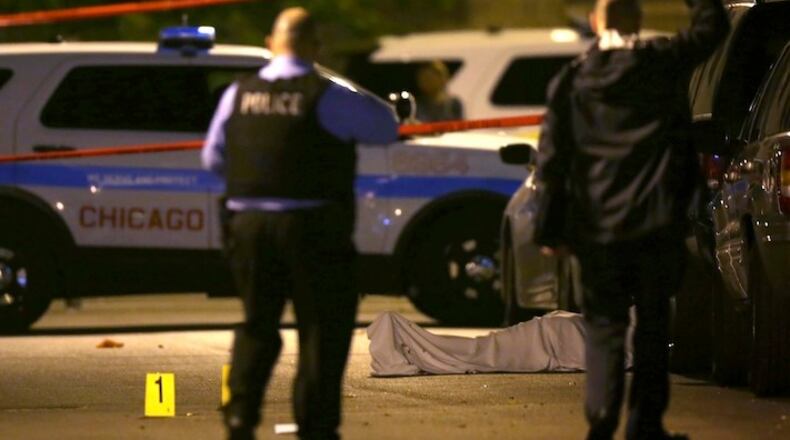President Donald Trump tweeted Tuesday night about Chicago's violence, saying he will "send in the Feds!" if the city "doesn't fix the horrible 'carnage' going on."
Trump's tweet refers back to a line in his inaugural address Friday about "the crime, and the gangs, and the drugs that have stolen too many lives and robbed our country of so much unrealized potential. This American carnage stops right here and stops right now."
The tweet cited numbers — "228 shootings in 2017 with 42 killings (up 24 percent from 2016)" — that come from Chicago Tribune data used in a news story Monday about violence in the city so far this year. As of Tuesday evening, there had been at least 247 people shot in Chicago, with at least 44 people killed, according to Tribune data.
A spokesman for Mayor Rahm Emanuel referred reporters to an interview on WTTW-Ch. 11 Tuesday night. Asked in that conversation about the White House website under the Trump administration citing violence in Chicago, Emanuel said that federal agencies including the FBI and the Bureau of Alcohol, Tobacco, Firearms and Explosives already do help the city, but more could be done.
"There's a lot the federal government can do," Emanuel said, citing gun control, use of federal resources to track illegal guns and federal prosecutions. "And also, fundamentally, in my view, also help fund additional police officers.
"Over the years the federal government's stepped back their resources, which we have stepped up. The federal government can be a partner, and to be honest they haven't been for decades."
In August, candidate Trump said "very top police" in Chicago had told him the city's crime problem could be stopped in a week with tougher tactics.
The comment came in an interview with Fox News host Bill O'Reilly, who had asked him how Chicago's violence could be quelled.
"How?" said Trump. "By being very much tougher than they are right now. They're right now not tough. I could tell you this very long and quite boring story. But when I was in Chicago, I got to meet a couple of very top police. I said, 'How do you stop this? How do you stop this? If you were put in charge — to a specific person — do you think you could stop it?' He said, 'Mr. Trump, I'd be able to stop it in one week.' And I believed him 100 percent."
At the time, Chicago police said Trump had not met with top brass since at least March. The Trump campaign did not identify who had claimed to have a one-week solution. "Mr. Trump spoke with some talented and dedicated police officers on a prior visit," Trump spokeswoman Hope Hicks had said in an email.
During the campaign, Trump often cited Chicago violence as an example of rampant urban crime that would be addressed if he were elected.
In September, Trump suggested in a TV interview that Chicago "is out of control" and needed to employ controversial "stop-and-frisk" police practices to stem violence.
"We did it in New York, it worked incredibly well," Trump said about stop-and-frisk practices. "You understand, you have to have, in my opinion, I see what's going on here, I see what's going on in Chicago, I think stop-and-frisk. In New York City, it was so incredible, the way it worked. Now, we had a very good mayor, but New York City was incredible, the way that worked, so I think that could be one step you could do.
"I think Chicago needs stop-and-frisk. Now, people can criticize me for that or people can say whatever they want."
In Chicago, police had used a similar practice for years, stopping people they deem suspicious and questioning them, sometimes patting them down. In 2015, the American Civil Liberties Union of Illinois considered suing the Chicago Police Department over the excessive use of the practice, which has been condemned by the ACLU as racial profiling.
Chicago police denied racial profiling, but entered into an agreement with the ACLU that required officers to more thoroughly document their street stops. The changes were also incorporated in a new state law.
Trump's tweet came a day after Emanuel made comments critical of the new president. The mayor criticized Trump for focusing on the size of the crowd at his inauguration ceremony and suggested his inaugural speech wasted an opportunity to appeal to "our better angels as a country."
The mayor also responded to the pro-law enforcement message on whitehouse.gov reading, "The dangerous anti-police atmosphere in America is wrong. The Trump administration will end it."
Emanuel said police need to have professional standards and public support, and acknowledged the "Ferguson effect" in which some officers may patrol less aggressively to avoid having their actions second-guessed. But Emanuel saw no need for departments to enact tactics like stop-and-frisk.
"Clearly police — there was a reaction of what happened across the country," Emanuel said. "On the other hand, the choice isn't just 'Go back to stop-and-frisk.' And this is not a bipolar, two camps. We need our police to have high professional standards, the training to support them in those high professional standards and the certainty to be proactively involved."
About the Author
Keep Reading
The Latest
Featured


